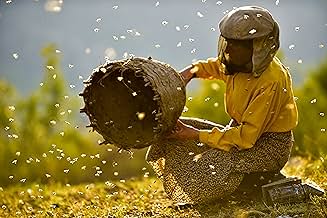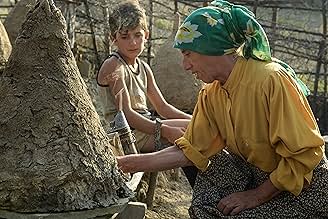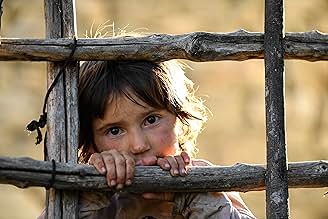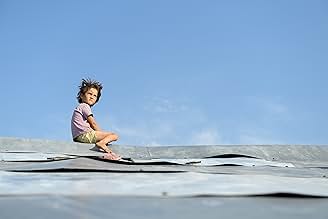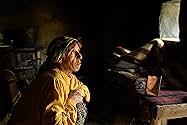IMDb रेटिंग
8.0/10
20 हज़ार
आपकी रेटिंग
एक महिला मैसेडोनिया के पहाड़ों में शहद की खेती करने के लिए प्राचीन मधुमक्खी पालन परंपराओं का उपयोग करती है. जब एक परिवार ऐसा करने की कोशिश करते हैं, तब वे उस महिला के तनाव का कारण बन जाते है... सभी पढ़ेंएक महिला मैसेडोनिया के पहाड़ों में शहद की खेती करने के लिए प्राचीन मधुमक्खी पालन परंपराओं का उपयोग करती है. जब एक परिवार ऐसा करने की कोशिश करते हैं, तब वे उस महिला के तनाव का कारण बन जाते हैं, क्योंकि वे उसकी सलाह की अवहेलना करते हैं.एक महिला मैसेडोनिया के पहाड़ों में शहद की खेती करने के लिए प्राचीन मधुमक्खी पालन परंपराओं का उपयोग करती है. जब एक परिवार ऐसा करने की कोशिश करते हैं, तब वे उस महिला के तनाव का कारण बन जाते हैं, क्योंकि वे उसकी सलाह की अवहेलना करते हैं.
- निर्देशक
- लेखक
- स्टार
- 2 ऑस्कर के लिए नामांकित
- 37 जीत और कुल 55 नामांकन
फ़ीचर्ड समीक्षाएं
In a microcosm you get to see what humans are doing wrong. The amount of time the filmmakers have spent with the subject of the film, shows in the level of intimacy that the camera has acquired in their lives. As if it's a pair of eyes. And not a camera. Making this a thoroughly engaging film.
Ljubo Stefanov and Tarmara Kotevska's HONEYLAND, an entrancing triple Sundance award winner is a stunning verite documentary. It plays so intimately, and with such verisimilitude that it feels almost like a narrative film. Our 'lead actress' is Hatidze, a lonely bee farmer of Turkish descent in the remote hills of Macedonia. She occasionally ventures into the larger town below to sell her high quality pure honey -- and to pick up a few provisions. Her only other companion is her frail mother Natife, who she cares for in their ramshackle hut. The scenes between them are so tender and detailed that it becomes almost unbearably palpable at times, whether it's the daughter gently tending to her blind eye, talking about marrying off the mid-50s woman, or sharing a meager meal of a single banana.
Their isolated like is loudly broken up by the arrival of a large itinerant family who comes with and even larger assembly of livestock. At first, Hatidze and the families head, Hussein, try and get along. The numerous children provide some comfort and companionship to the beekeeper. Finding out how much money Hatidze gets for her premium nectar, Hussein latches onto the idea of harvesting bees himself. Inevitably, tension and hardship follow.
What is most remarkable about HONEYLAND is that even though it functions as almost a narrative drama, none of it feels forced or constructed. The camerawork is particularly effective as the two cinematographers Fejmi Daut and Samir Ljuma bring us right into the scene whether it be spotting a single bee buzzing on a dripping honeycomb, Hatidze fingers gently touching her mother's face or the birth of a cow, the viewer is there. There aren't any fancy cuts or montages. The music is sparse, if noticeable at all, save for some scratchy source music that plays on an old radio attached to a homemade antenna trying to barely capture some signal from the world below.
HONEYLAND depicts a couple of significant events in Hatidze's life, but they aren't overly emphasized. They just play out, like simple steps in a life. The Documentary ends without triumph or tragedy - but, just a quite moment of solitude. Neither Hatidze, nor the viewer, knows what her fate may be, but, we do believe, she'll persevere.
What is most remarkable about HONEYLAND is that even though it functions as almost a narrative drama, none of it feels forced or constructed. The camerawork is particularly effective as the two cinematographers Fejmi Daut and Samir Ljuma bring us right into the scene whether it be spotting a single bee buzzing on a dripping honeycomb, Hatidze fingers gently touching her mother's face or the birth of a cow, the viewer is there. There aren't any fancy cuts or montages. The music is sparse, if noticeable at all, save for some scratchy source music that plays on an old radio attached to a homemade antenna trying to barely capture some signal from the world below.
HONEYLAND depicts a couple of significant events in Hatidze's life, but they aren't overly emphasized. They just play out, like simple steps in a life. The Documentary ends without triumph or tragedy - but, just a quite moment of solitude. Neither Hatidze, nor the viewer, knows what her fate may be, but, we do believe, she'll persevere.
This movie focuses on the tiny things that can make the life beautiful. Hatidze owns close to nothing, doesn't have own family but still manages to enjoy life.
What is the reason for Hatidze to continue living? Do we humans need to have a goal that drives us throug our everyday and what when we fail achieving it?
Those are the two questions that haunt me after watching this masterpiece.
What is the reason for Hatidze to continue living? Do we humans need to have a goal that drives us throug our everyday and what when we fail achieving it?
Those are the two questions that haunt me after watching this masterpiece.
"One half for me, one half for you."
3 years. 400+ hours of footage. My 2nd viewing. Yet I am still at a loss for words at how a film like this is even possible.
It somehow manages to present a grounded narrative, a parable of rural life, and a kind environmental message, all quietly captured through observational lens and intimate scope. You will witness everything from a cow giving birth to the near-drowning of a child (which, while brief, is very difficult to watch). The editing and fly-on-the-wall filmmaking style is superb.
Do not miss.
3 years. 400+ hours of footage. My 2nd viewing. Yet I am still at a loss for words at how a film like this is even possible.
It somehow manages to present a grounded narrative, a parable of rural life, and a kind environmental message, all quietly captured through observational lens and intimate scope. You will witness everything from a cow giving birth to the near-drowning of a child (which, while brief, is very difficult to watch). The editing and fly-on-the-wall filmmaking style is superb.
Do not miss.
The relatively modern tools Hussein uses to weigh honey only help to cement the film's clear microcosm of the tension between sustainability and industrialization; between restraint and a catastrophic lack of foresight. In that sense, watching "Honeyland" is like looking at the greatest problems of our time through a pinhole, but the film sees the situation with a clarity that gets under your skin and breaks your heart. Far from a scolding, rub-your-nose-in-it depiction of environmental havoc, this is a tender story about the chaos of abandoning the common good. By reflecting Muratova's relationship with her hives against the social contract that she's formed with her mother - and that binds Hussein to his family - Kotevska and Stefanov shine a light on what the bees have always told us: They survive by serving each other. And if they ever disappeared completely, people would only have themselves to blame.
क्या आपको पता है
- ट्रिवियाThe crew spent three years on location, for principal photography.
- गूफ़Much of the promotional material described Hatidze as the "last female wild beekeeper in Europe." Although traditional wild beekeeping has died out in most of Europe, it is still widely practised in Polissia (Polesia), located in modern Ukraine.
- भाव
Hatidze Muratova: Take half, leave half.
टॉप पसंद
रेटिंग देने के लिए साइन-इन करें और वैयक्तिकृत सुझावों के लिए वॉचलिस्ट करें
- How long is Honeyland?Alexa द्वारा संचालित
विवरण
- रिलीज़ की तारीख़
- कंट्री ऑफ़ ओरिजिन
- आधिकारिक साइटें
- भाषाएं
- इस रूप में भी जाना जाता है
- 蜂蜜之地
- फ़िल्माने की जगहें
- Bekirlija, North Macedonia(location)
- उत्पादन कंपनियां
- IMDbPro पर और कंपनी क्रेडिट देखें
बॉक्स ऑफ़िस
- US और कनाडा में सकल
- $8,15,082
- US और कनाडा में पहले सप्ताह में कुल कमाई
- $31,381
- 28 जुल॰ 2019
- दुनिया भर में सकल
- $13,14,260
- चलने की अवधि
- 1 घं 29 मि(89 min)
- रंग
- ध्वनि मिश्रण
- पक्ष अनुपात
- 1.85 : 1
इस पेज में योगदान दें
किसी बदलाव का सुझाव दें या अनुपलब्ध कॉन्टेंट जोड़ें




